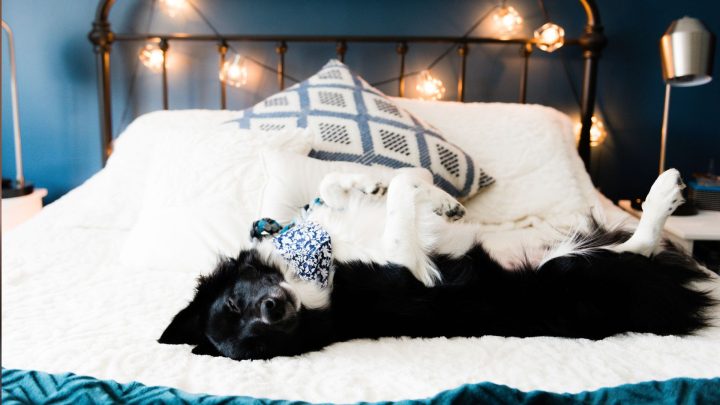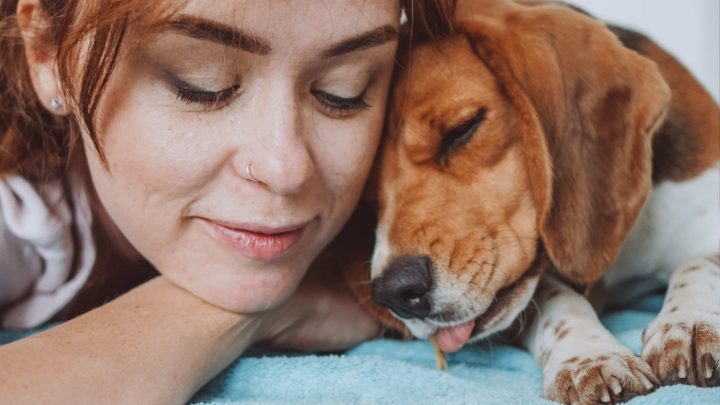How sweet that your pup loves to sleep on you! Most likely, it’s because they adore you. Even so, additional factors may be influencing their behaviour.
While most of the reasons are endearing, two can mean your dog isn’t faring well. Here are the possible motives, answering your question, “Why does my dog sleep on top of me?”

Table of Contents
- 1. Foremost, laying on you is instinctual.
- 2. Your dog wants to protect you.
- 3. Your pup is hungry for attention.
- 4. Your dog finds you blissfully cozy.
- 5. Laying on you is a habit.
- 6. Your pup is professing their love.
- 7. Your dog has separation anxiety.
- 8. Your pup is ailing physically.
- Easing Your Pup’s Attachment
- Handling Separation Anxiety
- Professional Management
- Self-Management
- Health Benefits for You
- Sweet Dreams
- FAQs
1. Foremost, laying on you is instinctual.
Dogs are descendants of wolves, living in a group called a “pack.” By this, the wolves warded off enemies, taking their cues from the pack leader. By huddling together, the animals felt safe and secure. On subzero winter nights, their collective warmth kept the wolves alive.
Even now, your dog wants to be part of a pack, the desire coded in their genes. This need is most apparent in puppies, seeking security by cuddling. Moreover, when your pup lays on you, they see you as a pack member.
“Yet, why does my dog sleep on me in particular?” you ask. If you’re their primary caregiver, they see you as the pack leader. Thus, when they choose to sleep on you, consider it an honor!
Plus, if your dog is a puppy, they miss their mum and siblings.
2. Your dog wants to protect you.
Since you’re a treasured pack member, your dog won’t let anything harm you. Hence, they stay close at hand. If your dog sleeps on you in bed, wary of potential threats, they’re on “guard duty.” Essentially, they’re saying, “I’ve got you covered!”
Your dog’s protective nature may extend to defenseless family members. For instance, some dogs guard babies and young children, napping alongside them.
Here’s another example of your dog’s possessiveness. They lay on you when you’re entertaining, cautiously eyeing your guests.
Oxytocin is a hormone that spurs loving feelings. Whenever you and your pup interact, you both generate oxytocin. Remarkably, smiling at your dog causes their oxytocin level to soar. Consequently, they adore you even more!
As your pup’s devotion grows, so does their fervent drive to protect you.
3. Your pup is hungry for attention.
Do you spend most of the day away from home? Or perhaps you’re mainly in the house but preoccupied. If so, your dog may feel neglected.
Since canines are social animals, they crave interaction. Additionally, some dogs pursue their caregivers because they’re bored.
Here’s how your dog thinks. “If I lay on top of my keeper, they’re sure to notice me.” Still, if you’re distracted or sound asleep, your dog may further prod you. Other means of attention-seeking are pawing, poking, and barking.
Your pup may use these strategies to draw your affection. Or they may want something else, such as food, playing with you, or going outside.
4. Your dog finds you blissfully cozy.
Here’s a concern raised by some pet owners. “Why is it that when my dog sleeps on me, they gravitate to my chest, shoulder, or head?” For owners with large breeds, their dog’s weight can be overbearing.
Still, let’s consider your dog’s viewpoint. “My keeper is so comfy,” they muse, snuggling on top of you. “Plus, when I’m tucked against them, I feel safe.”
Is your dog a small, short-haired breed? In that case, perhaps your body heat lures them. If your pup sleeps on you during winter only, this may be why.
5. Laying on you is a habit.
Here’s another common question. “Why does my dog lay on top of me whenever I relax on the couch?”
Perhaps, without realizing it, you’ve made it a habit. Does the following scenario apply to you?
After a busy day away, you return home, exhausted. Maybe you’ve had a rough time at work, school, or running errands. To unwind, you settle on the couch, watching TV. Within a few minutes, you have company, your pup leaning into you.
Unconsciously, you pet them. “Oh, this is so nice!” your dog sighs, inching closer. Next, you kiss them or rub their ears. Now, they’re on your lap. Since you don’t object, your dog thinks sleeping on you is okay.
After a few nights of doing this, it’s now a routine.
6. Your pup is professing their love.
Laying on you is one way your dog shows affection. Another expression is licking your hands and face, proving the bond between you is strong.
What forges your connection is the hormone oxytocin. Other names for this chemical messenger are the “cuddle hormone” and “love hormone.” Whenever you grin at your pup, pet them, snuggle, or play together, oxytocin surges in each of you. In turn, your mutual attachment increases.
Among all the reasons dogs sleep on their owners, this one is the sweetest.
7. Your dog has separation anxiety.
Let’s say you’re gearing up to leave the house. You’re sitting on the couch, putting on your shoes. What does it mean when your dog lays on you then? In that case, they could be dreading your departure.
Some dogs panic when their favourite person leaves the house. This fearful response is called “separation anxiety.” According to a 2014 New Zealand study, dogs most prone to this reaction are:
- males
- puppies taken from their mum before they’re 2 months old
- rescued dogs, living on the street or in shelters
Frantic behaviours include pacing, drooling, and trembling. Additionally, a dog may repeatedly howl, whine, or bark.
“Yet, why does my dog lay on me?” you ask. By this, they hope to keep you from leaving.
Once you’re gone, your dog may channel their distress by:
- biting and chewing their paws
- destroying objects
- soiling your floor or furniture
- trying to escape and bring you back
When you return, your dog may be so relieved, they lay on you at their first chance.
8. Your pup is ailing physically.
Is laying on top of you a recent development? In that case, your dog may seek emotional and physical comfort, especially if they’re in pain.
So, examine your dog thoroughly. If you don’t see anything amiss or abnormal, bring them to your vet. There may be a medical reason for why your dog constantly lays on you.

Easing Your Pup’s Attachment
“I’d rather my dog not sleep on me,” you say. Some pet owners feel this way, such as light sleepers. If you need your dog to stop, here’s what to do.
Use Positive Reinforcement
Reserve a comfy place for your dog to sleep, rewarding them when they comply. The following steps can help your pup favour their bed versus you.
- Obtain a bed tailored to your dog’s size and any specific needs. This article explains how to buy a dog bed, along with reviewing 13 high-quality versions sold online.
- Find a quiet spot for the bed, away from household traffic. Also, ensure the room temperature suits your dog.
- Holding a treat, lure your pup to their nest.
- Once they stand next to the bed, offer the reward.
- Coax them to lay down, giving another treat when they do. Also, praise your pup enthusiastically.
- Repeat this process three times daily. Since your dog expects rewards, they should warm up to their bed. Eventually, they should sleep there routinely.
Until that occurs, your pup may prefer resting on you. When they do, let them stay there for a few minutes. If you promptly shove your dog away, they’ll feel rejected, as though being punished. Thus, they’ll get confused and sad.
After you’ve cuddled briefly, create some space between you. One way is by changing your position, moving farther away. Other options are leading them to their cozy bed or placing it at your feet. If your dog takes to their bed, reward them with a treat, praise, and lots of petting.
Handling Separation Anxiety
If your dog can’t bear being apart from you, bring them to your vet. Extreme fear in pets can flag health problems. A vet can advise if your dog’s edginess has a medical cause.
Professional Management
If the vet diagnoses separation anxiety, consider hiring a pet behaviour counselor. The consultant will trace the root of your pup’s distress and devise a treatment plan.
To find a dog behaviourist, ask your vet for a referral. If the doctor can’t provide one, try this search tool for UK practitioners.
Self-Management
What if hiring an animal behaviourist isn’t affordable or practical? In that case, rather than medicating your dog, below are other means of helping them.
Soothing Supplement
All Natural Tranquillity is a calming herbal formula for pets, totally safe and non-sedating. This supplement quiets dogs and cats terrified by noises, travel, the vet, and being left alone.
With the included dropper, you can direct the liquid into your dog’s mouth. Or you can mix it with their food.
This product, sold by The Healthy Dog Co, was created with the input of vets, veterinary nutritionists, and pet food manufacturers. Here you can read customer reviews of All Natural Tranquillity.
Pheromones
Another option is using pheromones. Dogs naturally release these chemicals, affecting the social behaviours of their fellow canines.
There are several types of pheromones. For instance, nursing dogs confer a soothing pheromone to their puppies during weaning. Synthetic pheromones mimic this comforting effect.
A 2010 veterinary study showed that pheromones can resolve separation anxiety. Incidentally, they also soothe fear roused by thunder, fireworks, moving to a new home, and trips to the vet. WebMD sanctions pheromone pet products for separation anxiety.
Pheromone products come in collars, sprays, wipes, and plug-in diffusers. You can even buy a doggy coat infused with pheromones! You’ll find all these helpful aids at pet supply stores.
Desensitization
The term “desensitization” means acclimating your dog to your absence. Here’s how to proceed.
First, just before leaving home, give your dog a treat. By this, your dog forms a positive association with your heading out. Next, leave your pup alone for a brief period, followed by returning quickly. Then, gradually increase your time away.
If you live alone, set up a video camera in your home. This way, you can record your pup’s reaction while you’re gone. Is there a room your dog always trashes when you’re absent? If so, place the video camera there. Otherwise, put the equipment where your pup spends most of their time.
If your dog’s behaviour regresses, shorten your trips until they stabilize. Then, resume lengthening your absence.
Health Benefits for You
Is your pup welcome to sleep on you? If so, studies reveal several advantages. Your dog’s presence can:
- promote feelings of safety
- ease anxiety
- reduce blood pressure
- counter loneliness
- improve sleep quality
- avert depression
This article details the above benefits of sleeping close to your dog.
Sweet Dreams
Summing up, your dog may sleep on you because:
- it’s instinctive
- your dog wants to show their affection
- they’re protective
- you’re warm and comfy
- it’s a habit
- your dog seeks attention
- they feel sick
- your dog can’t bear being left alone
Do you need your cutie to stop sleeping on you? If they’re in good physical condition, train them to use their own bed. If you suspect they’re ill, promptly get a vet’s diagnosis and professional advice.
Does your pup show signs of separation anxiety? In that case, have your vet troubleshoot the problem, ruling out a medical cause. If your dog’s fear is emotional, consider helping them by hiring a pet behaviour counselor.
For self-management, options include:
- giving All Natural Tranquillity
- using pheromone products
- desensitization, easing your dog’s anxiety by degrees
Still, if your dog chooses you as their sleep buddy, here’s what it surely means. Your precious pup has entrusted their heart to you.
FAQs
It often reflects a combination of comfort, bonding, security, and affection. Some dogs may prefer sleeping near their owners, while others might be more independent and choose their own sleeping spots.





